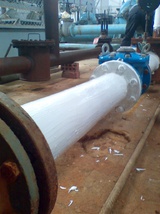Heat insulation of steam pipes
Heat insulation of steam pipelines is a challenge for different sectors of industry and energy.
Insulation of pipelines with superheated steam (steam pipelines) is a quite complicated operation, especially when it is needed to provide the necessary performance for surfaces with ultrahigh temperatures - 400 - 500°C. It is often necessary to make insulation without stopping the equipment operation.
Traditional insulation materials used for this purpose, have a number of significant deficiencies, which significantly reduces effectiveness of their application.
Mineral wool and mullite boards are "afraid" of water and steam. If they get in contact, the materials loose their thermal insulation performance dramatically. When exposed to high temperatures, mineral wool experiences the process of binders destruction (resins based on phenol and formaldehyde). This influences performance characteristics of the coating, not to mention the environmental issue. Traditional insulators require protective coating, at installation of which we will inevitably have a problem of quality insulation of complicated surfaces: joints, valves, which not only increases the cost of production, but also affects their quality. "Protective" materials wear out quickly, which inevitably leads to destruction of heat-insulating layers. Installation process is labor intensive and requires using specialized contractors. As a rule, steam pipelines insulated with mineral wool operate only 2-3 years. After that it is necessary to partially or completely replace the thermal insulation coating.
Other insulation - polyurethane foam - insulation on the basis of foam rubber, is not intended for use on high temperature surfaces.
An effective solution for thermal insulation of pipelines is Isollat-Effect combined system using Isollat liquid insulation:
- At temperatures below 150°C, Isollat CM-02 is used.
- At very high temperatures up to 500°C (in a peak mode - 600°C), Isollat 04 is used.
- Glass cloth or ceramic fiber (Isollat-Effect combination) are used as intermediate layers.
Isollat liquid insulation reliably isolates the most complicated surfaces, including sections with stop valves, providing 100% fit to the surface, preventing "holes" and sagging.
Isollat coating needs no additional protection, provides comprehensive heat insulation and anti-corrosion insulation of surfaces, and significantly reduces noise level. Insulation is carried out without stopping operating equipment.
Advantages of Isollat insulation:
- it is liquid;
- service life of the material is more than 10 years without loss of performance;
- it fits closely to the insulated surface;
- environmental friendliness;
- insulation and subsequent repair process can be performed without stops in the temperature range up to 500°C;
- simple installation -> reduces labor costs. The coating is applied by brush, spatula or using special high pressure spray painting units;
- resistance to high temperatures;
- serves as a finished topcoat without the need for additional "protection";
- corrosion protection;
- noise reduction.











